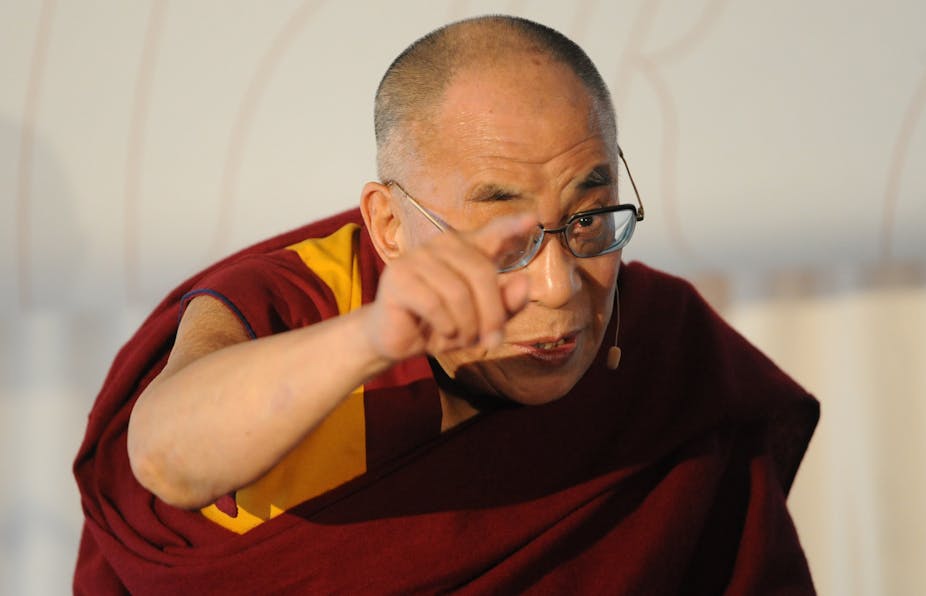Tibetan spiritual leader the Dalai Lama is currently in Australia yet Prime Minister Julia Gillard has refused to confirm whether she will meet him or not.
Federal Opposition Leader Tony Abbott and Greens leader Bob Brown have said they will meet with the man viewed with deep suspicion by China.
James Reilly, Lecturer in Northeast Asian Politics in the Department of Government and International Relations at the University of Sydney explains why the Prime Minister is so hesitant to meet a man popular with many Australians.
Why do Australian Prime Ministers traditionally not meet with the Dalai Lama?
It raises a lot of concerns in Australia’s relationship with Beijing. Julia Gillard had a pretty positive visit to Beijing recently so I think that the concern is about raising Beijing’s anger.
What would make Beijing so angry about the Prime Minister meeting with the Dalai Lama?
China has traditionally been extremely concerned with offering the Dalai Lama international legitimacy as a sort of equivalent to any kind of representative of a quasi-state or independent political entity.
It is a concern about the sovereignty issue. It is the same kind of concern China has with anyone meeting with the President of Taiwan as an independent leader, as this would suggest some kind of independence or autonomy for Tibet or Taiwan.
China has always raised a good deal of criticism, often times accompanied with vague economic threats, for countries whose head of state or leader meets directly with the Dalai Lama.
The more political the meeting, the more formal status the Dalai Lama is accorded equivalent to a head of state, the stronger Beijing’s concerns.
Do the Chinese overreact to leaders meeting the Dalai Lama?
For China this is primarily an issue of sovereignty and territorial integrity. The view from Beijing is that this is not just a pleasant discussion or a meeting with an individual from a religious point of view. For China the concern is the challenge to their sovereignty over their territory, namely the territory of the autonomous region of Tibet which is considered by China, and recognised by the world generally, as a part of the People’s Republic of China.
So for China the extent that people accord the appearance of international legitimacy to the Dalai Lama as equivalent to what they would offer a head of state seems to be suggesting supporting those voices within the Tibetan movement that think Tibet should be independent, that Tibet should be separate from China.
This is of great significance for national integrity and sovereignty and that is why Beijing’s voice is quite strident on this.
Is Australia being a good friend or are we losing sovereignty? We would never met with someone the US disapproves of.
The recent trend among Western leaders in Europe and the United States has been to have the head of government or the head of state meet with the Dalai Lama. In terms of a political strategy, he has had a good deal of success.
He has meet with Chancellor Angela Merkel of Germany, with Prime Minister Stephen Harper of Canada, former Prime Minister of Britain Gordon Brown and of course with President Sarkozy of France as well as with John Howard when he was Prime Minister.
The arguments that most leaders tend to give are two-fold. Generally there is a careful effort to articulate that they see this meeting with the Dalai Lama as an individual, as a representative of Tibetan Buddhism and the religious symbolism that he represents. That is an effort to de-politicise the Dalai Lama.
Ironically, many leaders also tend to see meeting with the Dalai Lama as an important statement on their human rights concerns within China proper. So in that way, they are politicising their meeting at the same time.
Sarkozy was particularly articulate in this approach, though being careful to say that he doesn’t support independence for Tibet.
Of course leaders face pressure from their domestic constituencies, particularly on the issue of human rights and from those people who see the Dalai Lama are a non-political figure.
At the same time, Beijing sees him as a deeply political figure.
Is there a chance for rapprochement between China and the Dalai Lama? If you look at Northern Ireland, stranger things have happened.
I think it is extremely unlikely and I think the situation is actually getting worse, because the Dalai Lama is about to step down from his position.
Instead, there has been an election and an alternative leader coming to the fore to represent the Tibetan diaspora. I think to this extent there is less ability to be flexible on the Tibetan side, so if there is somebody that doesn’t have the prestige of the Dalai Lama they will be very hard pressed to bring the overseas Tibetan movement together to support a controversial agreement with China.
Finding that common ground might be more difficult as the Tibetan movement becomes more democratic and more broadly based. So once this this Dalai Lama as an individual moves off the political stage, the hopes for rapprochement become more difficult.
Maybe there has been a window of opportunity that has passed. Whether it was realistic or not I don’t know, but that kind of grand bargain deal that would satisfy the overseas Tibetan community becomes more and more unlikely as time passes.

